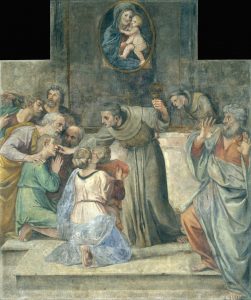Illuminations on the Lectionary readings for March 19, 2023 (Lent 4A)
First Reading: 1 Samuel 16:1-13
Through Sunday’s Lectionary readings we reflect on light and sight: What do we see, and how do we see it?

Healing the Man Born Blind (1605-1606), fresco for the Church of San Giacomo degli Spagnuoli, Rome, by Annibale Carracci (1560-1609), later transferred to canvas. Museu Nacional d’Art de Catalunya, Barcelona. (Click image to enlarge)
In our first reading, we learn that God has rejected Saul as king of Israel. Now God sends a rather unwilling Samuel to take on the risky chore of finding a successor to Saul. God sends Samuel to Jesse the Bethlehemite, among whose eight sons God has chosen the next king. Samuel examines seven of the young men, one at a time, but doesn’t find God’s chosen one. Asking if there is any other, Samuel discovers David, Jesse’s youngest son, who had seemed such an unlikely choice that he had been sent to watch the sheep. But God saw the spirit in David that the others could not detect. David is to become king and will be next in the Messiah’s line.
Psalm: Psalm 23
Who doesn’t know and love the 23rd Psalm? It brings comfort in time of trouble and trial, reminding us that in our darkest hours and most threatening times, God walks with us, protects us and comforts us. Ancient tradition held that David himself wrote these verses. Most modern scholars doubt that. But kings and commoners alike can take joy from knowing that God’s rod and staff comfort us, and God’s goodness and mercy follow us all the days of our lives.
Second Reading: Ephesians 5:8-14
This short letter, probably written in Paul’s name a generation or more after his death, contains some problems for modern Christians who take it out of its historical and cultural context. It appears to sanction slavery, for example, and it firmly puts women in their place as “subject” to their husbands. Sunday’s short passage, however, offers a poetic view of light against darkness. Perhaps echoing John’s vision of Jesus as the light shining in the darkness, it points us toward the Gospel about the man born blind.
Gospel: John 9:1-41
For millennia many humans have held on to the troubling idea that blindness and other disabilities are God’s way of punishing a person’s sins or even the sins of their ancestors. In this Gospel, Jesus makes it clear that God does no such thing. In a long narrative we hear the intriguing details about how Jesus healed the man with a mixture of mud and saliva spread on his eyes and washed in a pool. Then Jesus disappears from the narrative, leaving us to listen in on a long and fruitless discussion among the Pharisees, the no-longer-blind man, and his family. Finally Jesus returns, and his words make clear that God works in the world through grace, not punishment, and that the miracle of healing cannot come from sin or evil.
